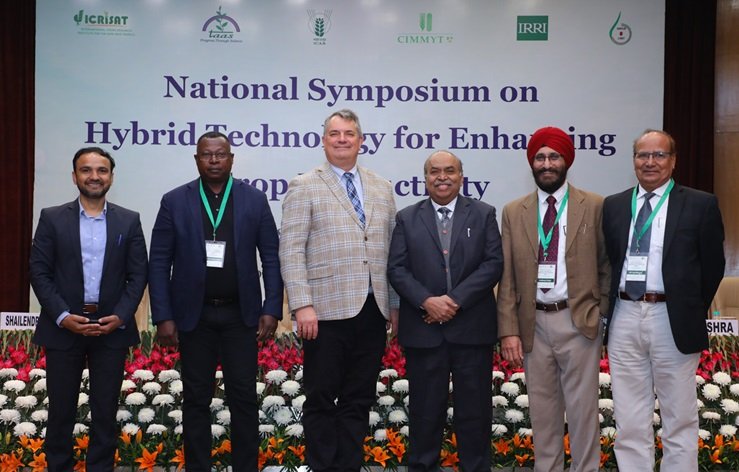Saturday, 28 February 2026

The event ‘National Symposium on Hybrid Technology for Enhanced Crop Productivity’ brought together about 300 stakeholders, including researchers, policymakers, representatives of CGIAR centres, and private sector leaders.
Leading agricultural experts have called for accelerated adoption of hybrid technology to address India’s growing food security challenges, climate change effects, and sustainable development goals. Speaking at the Inaugural Session of National Symposium on Hybrid Technology for Enhanced Crop Productivity, held on January 8, 2025, at the National Agriculture Science Complex (NASC), Pusa Campus, New Delhi, they emphasised the transformative potential of hybrid breeding and seed innovations to boost productivity and resilience in Indian agriculture.
Organised by the Trust for Advancement of Agricultural Sciences (TAAS) in collaboration with the Indian Council of Agricultural Research (ICAR), International Crop Research Institute for the Semi-Arid Tropics (ICRISAT), International Maize and Wheat Improvement Centre (CIMMYT), and International Rice Research Institute (IRRI), and Indian Society of Plant Genetic Resources (ISPGR), the symposium brought together about 300 stakeholders, including researchers, policymakers, representatives of CGIAR centres, and private sector leaders. The event was supported by the Federation of Seed Industry of India (FSII), Maharashtra Hybrid Seed Company (MAHYCO), Rasi Seeds, and Bayer Crop Science Limited.
Dr P. K. Mishra, Principal Secretary to the Prime Minister, who inaugurated the symposium, highlighted the urgent need for hybrid technologies to ensure food and nutritional security for the country’s growing population. He highlighted that Hybrid technology has to play a role beyond just increasing yields. It should lead to equitable, inclusive and sustainable growth of economy. It should also lead to transformation of agriculture through increasing farmers’ incomes. Reducing poverty is very important and agriculture has an important role to play.
He further mentioned that Hybrid research has to produce products that have higher productivity than OP Varieties. Example- Rice, Pulses and Oilseeds need high priority in hybrid research. We need to bring Hybrid Pigeon pea to market and scale it up. This will help in bridging availability gap in pulses. Similarly in oilseeds too we should increase productivity using hybrids. This is a priority for the country. Hybrids have to be affordable to smallholder farmers. If research can make farmers save hybrid seeds from one season to another season without losing heterosis, as they do with OP crops, it would be great scientific contribution to increasing farmers’ incomes.
Dr R.S. Paroda, Chairman, TAAS, stressed the importance of public-private partnerships to drive hybrid adoption. There is a greater importance and urgency for good hybrid technology. He emphasised that to have vertical improvement, hybrid crops do provide great opportunity, access to good quality seed is important, Green Revolution was innovation-led and focus needs to be given on innovations for breeding new hybrids. He stressed on need for a National Mission on Hybrid Development. Also, we need to have a clear policy on GM Crops, seed industry to be incentivised and the GST on sale of seed be exempted.
Dr. T. Mohapatra, Chairperson, PPVFRA, outlined the critical role of research and innovation in scaling hybrid technologies to mitigate climate challenges. Dr Stanford Blade, Director General, ICRISAT stressed on the need for accelerated improvement and public-private partnership in a consortium mode.
Ajai Rana, Chairman, FSII, emphasized the necessity of enabling policies and collaborative frameworks to increase research for hybrid development and deployment of modern science and technology through effective research collaboration and partnership for access and benefit sharing.